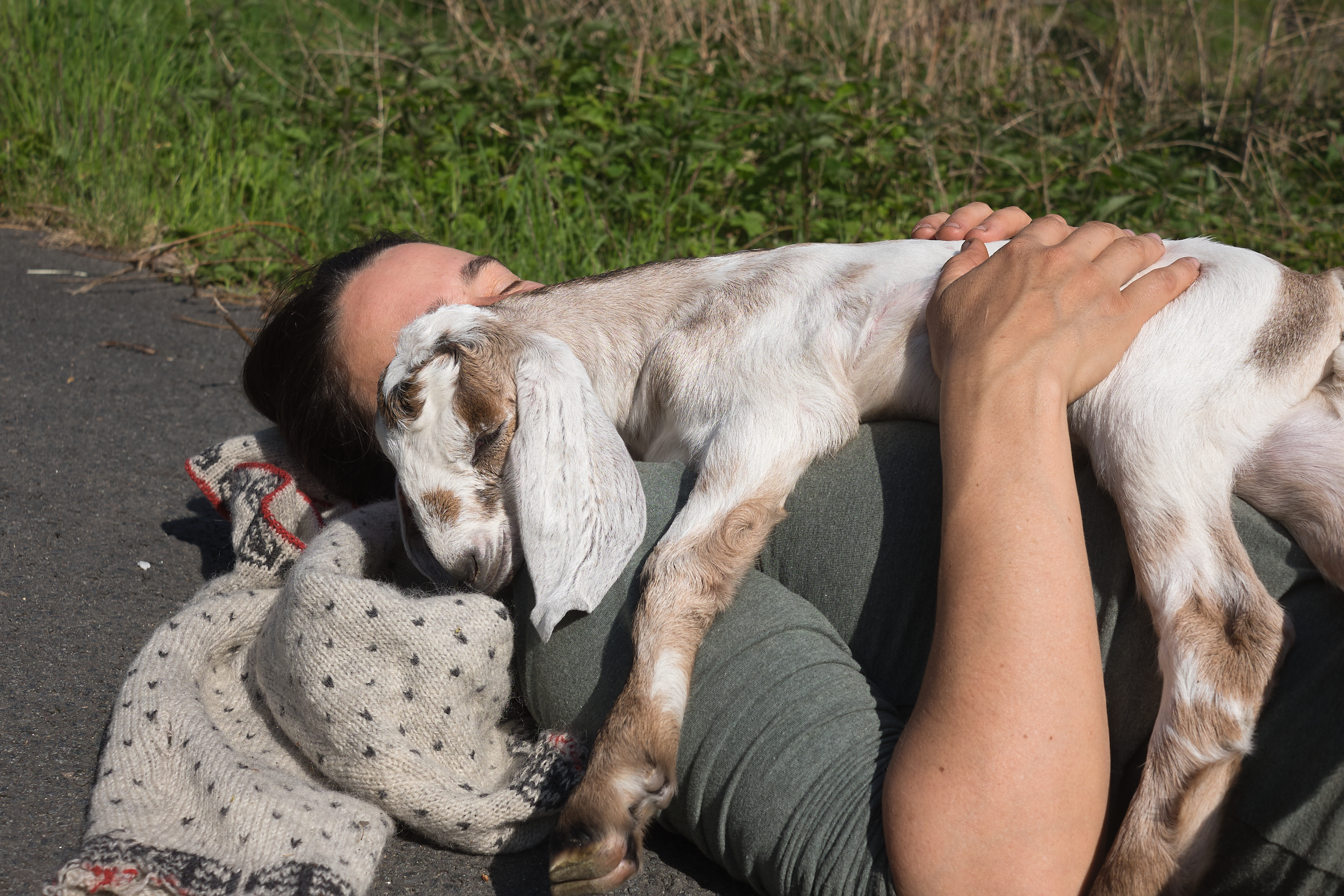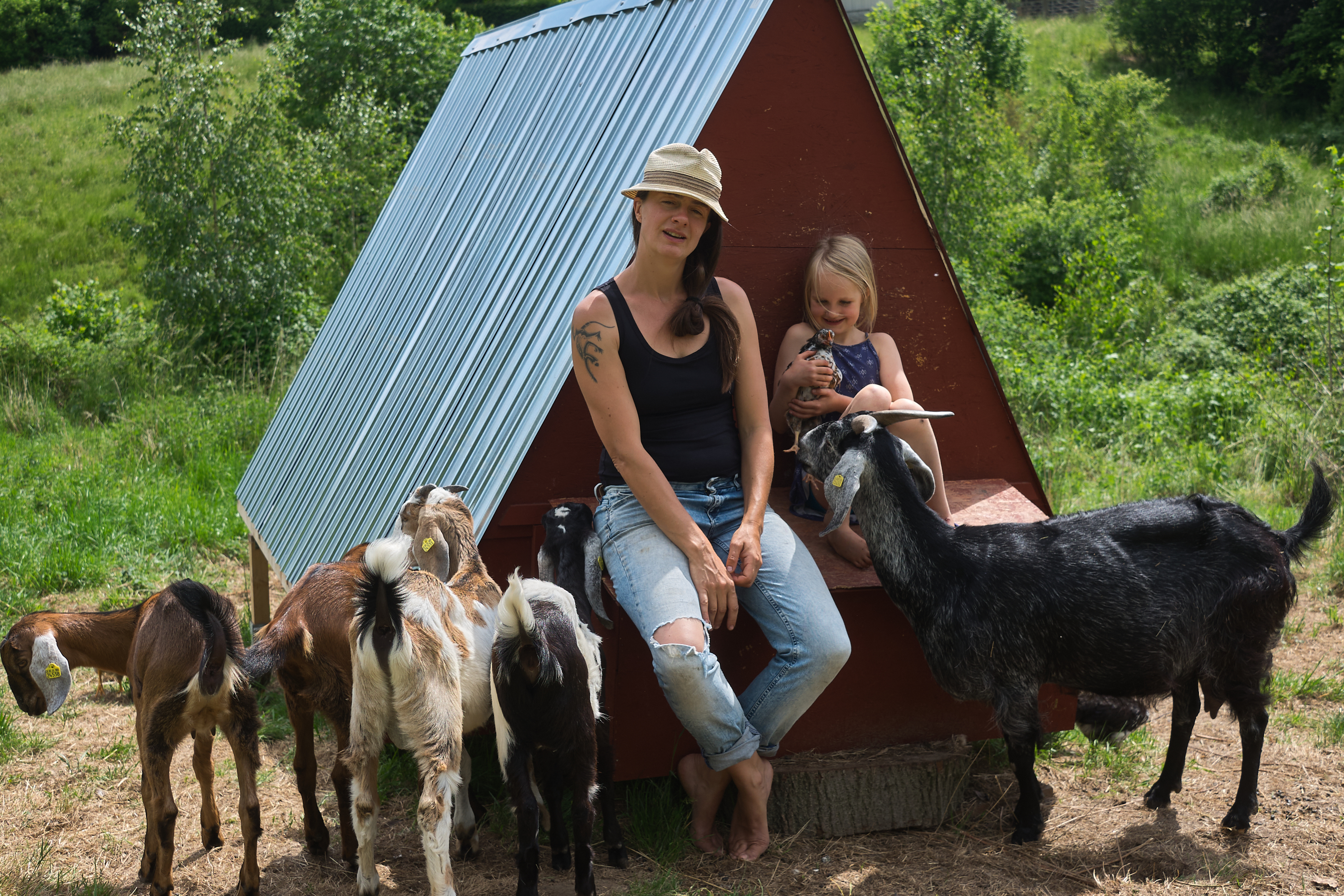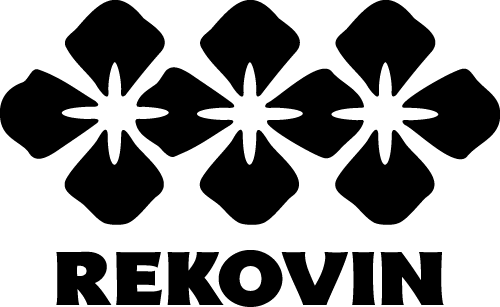DOWN
TO
EARTH
GOTLAND

Hos våra vinodlare finns det ett par återkommande teman och filosofier kring odlande som vi hör igen och igen; Jordmånen är allt, inget tillagt/inget borttaget, naturen gör saker bättre än vad vi någonsin kan! Det kan vara lätt att glömma att mycket av hur naturvin görs idag har sina rötter i
biodynami, permakultur & regenerativodling. Inget sker i ett vakuum och det finns människor i olika fält som på olika sätt jobbar mot vad som egentligen är samma mål; att begränsa det ekologiska avtrycket och bygga bättre, mer hållbara sätt för framtiden.
Annelie Wendeberg är inte en vinodlare. Men hon är en bonde som har forskat inom miljövetenskap i 20 år och har tillsammans med hennes familj flyttat från Tyskland till Gotland för att starta en regenerativ bondgård. Deras mål är att lära ut och dela kunskap om regenerativa odlingsmetoder för att redan inom tre år få hela Gotlands lantbruk att bli klimat-positivt! För att komma närmre deras ambitiösa mål så har Annelie nu startat en Kickstarter för ett projekt som hon kallar Down to Earth Gotland. Pengarna från kickstartern kommer gå till att bygga ett lokalt nätverk för att göra det så enkelt som möjligt för andra odlare att börja odla regenerativt.
Down to Earth Gotland är ett ambitiöst och helhjärtat projekt, vi har givit lite pengar och tycker definitivt att ni också borde göra det! Deras mål är 67 500kr och just nu (kl 15:11 den 9e Fabruari) har dem nått ca 20% av det målet.
Länk till kickstartern här.
Vi var nyfikna, så vi skickade iväg ett mail till Annelie och frågade om hon skulle vilja gå in i lite mer detaljer för oss. Hon svarade generöst nog ja, trots att killing säsongen är i full gång och hon har minst sagt fullt upp med att marknadsföra Down to Earth projektet.
Annelie Wendeberg är inte en vinodlare. Men hon är en bonde som har forskat inom miljövetenskap i 20 år och har tillsammans med hennes familj flyttat från Tyskland till Gotland för att starta en regenerativ bondgård. Deras mål är att lära ut och dela kunskap om regenerativa odlingsmetoder för att redan inom tre år få hela Gotlands lantbruk att bli klimat-positivt! För att komma närmre deras ambitiösa mål så har Annelie nu startat en Kickstarter för ett projekt som hon kallar Down to Earth Gotland. Pengarna från kickstartern kommer gå till att bygga ett lokalt nätverk för att göra det så enkelt som möjligt för andra odlare att börja odla regenerativt.
Down to Earth Gotland är ett ambitiöst och helhjärtat projekt, vi har givit lite pengar och tycker definitivt att ni också borde göra det! Deras mål är 67 500kr och just nu (kl 15:11 den 9e Fabruari) har dem nått ca 20% av det målet.
Länk till kickstartern här.
Vi var nyfikna, så vi skickade iväg ett mail till Annelie och frågade om hon skulle vilja gå in i lite mer detaljer för oss. Hon svarade generöst nog ja, trots att killing säsongen är i full gång och hon har minst sagt fullt upp med att marknadsföra Down to Earth projektet.

How long have you been going with the regenerative farm and what have
you gotten done so far?
We moved from Germany to Gotland in August 2020 together with a flock of dairy goats and sheep, two dogs, two kids, and a cat that went missing somewhere in the woods around Kalmar but was reunited with us three months later.
The land we bought was an abandoned pasture, and the house used as a summer residence, so there was quite a lot to do to turn the whole thing into a working farm. In the first year, we built a milking parlor (sounds luxurious, but it was just a milking stand in the barn and me hand milking twice a day), dug swales and planted walnut trees, set up a tiny cheese kitchen and an even tinier farm shop, built a huge polytunnel that we use as a greenhouse in summer and animal shelter in winter, and pulled more fences than I care to count. There was more going on, of course, but it got lost in all the chaos.
What's the driving force behind Down to Earth Gotland?
Climate change mitigation. We worked in environmental sciences for 20 years and just studying the problem wasn’t enough. We wanted to be part of the solution. We met a lot of like-minded people here on Gotland, and together with Hotel Stelor and Three Pheasants we started Down to Earth Gotland this winter.
Your “mission-statement” in the Kickstarter says you want to make it simple for farmers to transition to regenerative farming methods. How will you go about making it easier for other farmers to adopt these methods?
We found that the main roadblocks for a wide adoption of regenerative methods in agriculture are know-how and money. We’d like to build a network of regenerative farmers and those who are interested in regenerative farming. The heart will be a hands-on and online learning hub that also invites companies, organisations, families and individuals who are interested in supporting our farmers and learning about food and where it comes from. To help with the financial side of transitioning to regenerative farming, we want to build new markets for farmers in our network. For example, by building our own local delivery network that brings farm-fresh produce directly to the consumer, to restaurants, and our own farm shop in Visby and Stockholm. We’d also like to help our farmers diversify their income and apply for EU funding.
What activities does this include?
For guest, that would include farm tours, farm stays, and workshops for example. For our farmers we’d like to organize meetups, workshops, and conferences. Online lectures will also be available.
Regenerative farming is a bit difficult to define as it’s not exactly “one thing”. How would you define or explain regenerative farming?
I like that regenerative farming isn’t pressed into a rigid mold. There are so many ecological, climatic, sociological and economical differences. A strict definition does not appreciate the diversity of farms and farmers around the world.
But the fundamental principles of regenerative farming are to keep the soil covered and minimise soil disturbance, preserve living roots in the soil year-round, increase biodiversity, build up organic carbon, integrate livestock, and limit or eliminate the use of synthetics such as pesticides and fertilisers. The main goals of regenerative farming are to regenerate the soil and the land, and to provide environmental, economic, and social benefits to the community.
We know firsthand that certifications can be as tricky. In the natural wine scene, a lot of farmers were initially hesitant towards completely “defining” natural wine making so strictly. Do you regard certifications as helpful and what's your view on certifications around regenerative farming?
That’s a very difficult question. There’s so much greenwashing going on that certificates can be a huge help but can also lead to confusion. Organic cotton is a great example. Check the label of your T-shirt. If it reads “organic cotton” it’s not necessarily “certified organic cotton” because the term “organic” is probably not protected in the country of manufacturing. Even if the label reads “certified organic cotton” this only means that the cotton was grown under certified organic farming standards. The processing (ginning, spinning, knitting, dyeing and so on) might have been done under the most horrendous conditions for people and planet. However, if your T-Shirt label reads “GOTS certified organic” you can be sure that the entire supply chain was certified organic and ethical.
The same is true for food. There are so many organic labels for food, yet much of it is packed in plastic and/or coming from very far away.
For our Down to Earth Gotland network, we’d like to invite everyone to come and see for themselves where their food comes from, how the fields look, the forests, how the animal fare and the farmers. Further down the road, we want to establish our own Ecological Outcome Verification, which basically measures how soil health, biodiversity, organic carbon content etc. improve over time on the farms in our network.
The Kickstarter is almost at 20% funded. You’re asking for 67 500kr, I definitely think there’s a lot of people willing to rally behind a cause like this! What activities will they contribute to if they donate?
We’re not really looking for donations. People can back our project by booking a farm experience with us, or if Gotland is too far away, they can plant a tree or herbal ley, or take one of our upcoming online courses. That’s the beauty of a Kickstarter campaign: You can support a project by buying the final product before it is created.
How can we help?
By spreading the word or coming for a visit. Bring wine! ︎
I suppose the project is a bit different from a lot of other Kickstarters, in that there won’t necessarily exist a “product” by the end of it. How do you see the project evolving or continuing beyond these first three years?
Yes, that’s true. Many Kickstarter campaigns are for games or gadgets that can be shipped all over the world. Our “product” is a bit more complicated than that, and doesn’t fit “consumerist” behaviour at all, because people have to plan their vacation around our farm adventures. But there are the rare few Kickstarter projects that managed to seed-financed restaurants and other locations that might be considered similar to what we’re offering.
As for the evolution of this project: We’re hoping that a lot of Gotland’s farmers are interested in joining us, and it’s looking pretty good so far. Ideally, this network will function like a tight-knit community where everyone can ask for help and find it fast.
And I hope that we’ll soon find companies who are willing to sponsor our initiative, because we’ll need a greater financial flexibility than Kickstarter and EU funding can offer.
www.kickstarter.com/projects/tradverk/down-to-earth-gotland
www.instagram.com/down2earthgotland/
We moved from Germany to Gotland in August 2020 together with a flock of dairy goats and sheep, two dogs, two kids, and a cat that went missing somewhere in the woods around Kalmar but was reunited with us three months later.
The land we bought was an abandoned pasture, and the house used as a summer residence, so there was quite a lot to do to turn the whole thing into a working farm. In the first year, we built a milking parlor (sounds luxurious, but it was just a milking stand in the barn and me hand milking twice a day), dug swales and planted walnut trees, set up a tiny cheese kitchen and an even tinier farm shop, built a huge polytunnel that we use as a greenhouse in summer and animal shelter in winter, and pulled more fences than I care to count. There was more going on, of course, but it got lost in all the chaos.
What's the driving force behind Down to Earth Gotland?
Climate change mitigation. We worked in environmental sciences for 20 years and just studying the problem wasn’t enough. We wanted to be part of the solution. We met a lot of like-minded people here on Gotland, and together with Hotel Stelor and Three Pheasants we started Down to Earth Gotland this winter.
Your “mission-statement” in the Kickstarter says you want to make it simple for farmers to transition to regenerative farming methods. How will you go about making it easier for other farmers to adopt these methods?
We found that the main roadblocks for a wide adoption of regenerative methods in agriculture are know-how and money. We’d like to build a network of regenerative farmers and those who are interested in regenerative farming. The heart will be a hands-on and online learning hub that also invites companies, organisations, families and individuals who are interested in supporting our farmers and learning about food and where it comes from. To help with the financial side of transitioning to regenerative farming, we want to build new markets for farmers in our network. For example, by building our own local delivery network that brings farm-fresh produce directly to the consumer, to restaurants, and our own farm shop in Visby and Stockholm. We’d also like to help our farmers diversify their income and apply for EU funding.
What activities does this include?
For guest, that would include farm tours, farm stays, and workshops for example. For our farmers we’d like to organize meetups, workshops, and conferences. Online lectures will also be available.
Regenerative farming is a bit difficult to define as it’s not exactly “one thing”. How would you define or explain regenerative farming?
I like that regenerative farming isn’t pressed into a rigid mold. There are so many ecological, climatic, sociological and economical differences. A strict definition does not appreciate the diversity of farms and farmers around the world.
But the fundamental principles of regenerative farming are to keep the soil covered and minimise soil disturbance, preserve living roots in the soil year-round, increase biodiversity, build up organic carbon, integrate livestock, and limit or eliminate the use of synthetics such as pesticides and fertilisers. The main goals of regenerative farming are to regenerate the soil and the land, and to provide environmental, economic, and social benefits to the community.
We know firsthand that certifications can be as tricky. In the natural wine scene, a lot of farmers were initially hesitant towards completely “defining” natural wine making so strictly. Do you regard certifications as helpful and what's your view on certifications around regenerative farming?
That’s a very difficult question. There’s so much greenwashing going on that certificates can be a huge help but can also lead to confusion. Organic cotton is a great example. Check the label of your T-shirt. If it reads “organic cotton” it’s not necessarily “certified organic cotton” because the term “organic” is probably not protected in the country of manufacturing. Even if the label reads “certified organic cotton” this only means that the cotton was grown under certified organic farming standards. The processing (ginning, spinning, knitting, dyeing and so on) might have been done under the most horrendous conditions for people and planet. However, if your T-Shirt label reads “GOTS certified organic” you can be sure that the entire supply chain was certified organic and ethical.
The same is true for food. There are so many organic labels for food, yet much of it is packed in plastic and/or coming from very far away.
For our Down to Earth Gotland network, we’d like to invite everyone to come and see for themselves where their food comes from, how the fields look, the forests, how the animal fare and the farmers. Further down the road, we want to establish our own Ecological Outcome Verification, which basically measures how soil health, biodiversity, organic carbon content etc. improve over time on the farms in our network.
The Kickstarter is almost at 20% funded. You’re asking for 67 500kr, I definitely think there’s a lot of people willing to rally behind a cause like this! What activities will they contribute to if they donate?
We’re not really looking for donations. People can back our project by booking a farm experience with us, or if Gotland is too far away, they can plant a tree or herbal ley, or take one of our upcoming online courses. That’s the beauty of a Kickstarter campaign: You can support a project by buying the final product before it is created.
How can we help?
By spreading the word or coming for a visit. Bring wine! ︎
I suppose the project is a bit different from a lot of other Kickstarters, in that there won’t necessarily exist a “product” by the end of it. How do you see the project evolving or continuing beyond these first three years?
Yes, that’s true. Many Kickstarter campaigns are for games or gadgets that can be shipped all over the world. Our “product” is a bit more complicated than that, and doesn’t fit “consumerist” behaviour at all, because people have to plan their vacation around our farm adventures. But there are the rare few Kickstarter projects that managed to seed-financed restaurants and other locations that might be considered similar to what we’re offering.
As for the evolution of this project: We’re hoping that a lot of Gotland’s farmers are interested in joining us, and it’s looking pretty good so far. Ideally, this network will function like a tight-knit community where everyone can ask for help and find it fast.
And I hope that we’ll soon find companies who are willing to sponsor our initiative, because we’ll need a greater financial flexibility than Kickstarter and EU funding can offer.
www.kickstarter.com/projects/tradverk/down-to-earth-gotland
www.instagram.com/down2earthgotland/
